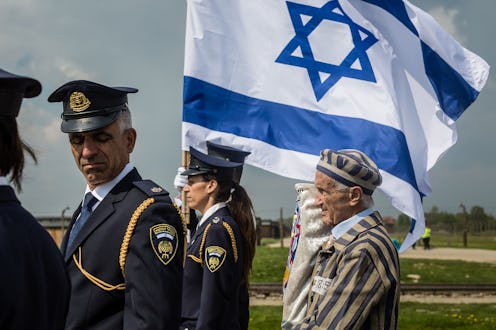News
Today Was The March Of The Living
The 28th annual March of the Living took place in Poland on on May 5 — National Holocaust Remembrance Day. Thousands of people partook in the somber march, a two-mile walk between the Auschwitz and Birkenau concentration camps. Among the thousands who attended the March of the Living were approximately 150 Holocaust survivors, many returning to Poland for the first time since their imprisonment. It's been over 70 years since the end of World War II, so all of the approximately 500,000 Holocaust survivors still alive are nearing their last years of life. For this reason, the March of the Living and Holocaust Remembrance Day highlight the importance of listening to, and learning from, the survivors so that their messages are not forgotten — and to ensure that such horrible events are not repeated.
Many Holocaust survivors attended the March of the Living in order to pay homage to those who were killed during the Holocaust, themselves. Sam Peltz is an 83-year-old Holocaust survivor from Poland who now lives in the United States. At the 2016 march from Auschwitz to Birkenau, he expressed the importance of remembrance, saying to the Associated Press:
I am here in memory of all the brothers and sisters of the Jewish faith who perished because they were Jewish. I want to make sure that I, and with all these kids who are here, pay homage to them.
Hugo Schiller, a Holocaust survivor who resides in Florida, did not attend the event in Poland, however, this survivor's message on Holocaust Remembrance Day serves as a reminder that remembrance is needed to prevent tragedies like the Holocaust, and that it's crucial to learn from the memories. He says of the state of the world in the decades after the Holocaust, telling WBTW:
We haven’t learned very much. And certainly we have had our Rwanda’s after this where people were killed just because of who they are... There’s always hope but so far we haven’t evolved since the time of the Holocaust.
Schiller shares a somber truth: The world has not learn from the Holocaust — yet. Genocides and discrimination continue.
Schiller's message was echoed by survivors as well as attendants at the march in Poland who were not alive during the Holocaust. David Baker of London told The Washington Post his reasons for attending the March of the Living, bringing up instances of discrimination, today:
I am here because I am Jewish. My family doesn’t have any direct connection with the Holocaust, thank God, but I am also a gay man, and I am very aware that plenty of homosexuals were also rounded up and murdered by the Nazis in these camps. ... We are also having a debate in Europe about how to welcome refugees from Syria and the big question for us is how much we as Jews should welcome them into Europe, even though we worry they might come with anti-Semitic ideas. And personally I believe we should be more welcoming.
Undoubtedly, more people should listen to advice from survivors — as Baker did at the march on Thursday — and learn to be accepting of those who are different from themselves.
Primo Levi was a renowned Chemist and Holocaust survivor who died in 1987. However, a famed quote by him often resurfaces on Holocaust Remembrance Day:
We must be listened to: above and beyond our personal experience, we have collectively witnessed a fundamental unexpected event, fundamental precisely because unexpected, not foreseen by anyone. It happened, therefore it can happen again: this is the core of what we have to say. It can happen, and it can happen everywhere.
The survivors, and the people taking time to bear witness to the survivors' stories at the March of the Living, seem to have taken Levi's message to heart. However, as Schiller pointed out, not enough people have listened, yet — if they had, then perhaps numerous other tragic instances of discrimination could have been avoided. Hopefully, the survivors' messages will spread, preventing future tragedy.
